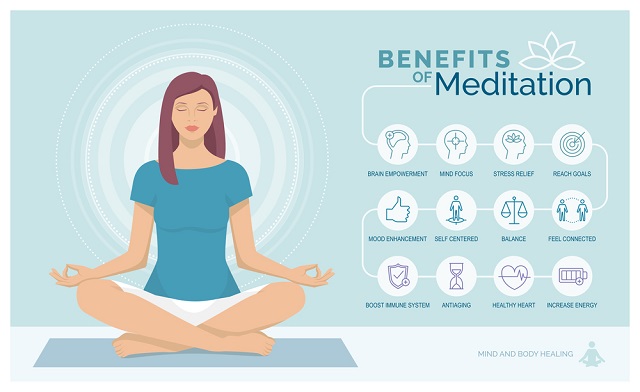Can Meditation Cure All Diseases? The Power of Meditation
Can Meditation Cure All Diseases? The healing potential of meditation has been a subject of fascination and exploration in recent years as more individuals seek alternative and holistic approaches to wellness. In a world dominated by technological advancements and fast-paced living, the quest for a remedy that addresses both the physical and mental aspects of health has led many to rediscover the ancient meditation practice.
This article delves into the question: Can Meditation Cure All Diseases? Examining the power of meditation, we explore its roots, evolution, and the scientific insights that suggest it might be a key player in the pursuit of overall well-being.

The science behind meditation and its benefits
Once considered a spiritual or esoteric practice, meditation is gaining widespread recognition for its scientifically proven benefits. This section will delve into the compelling science behind meditation and the multifaceted ways it contributes to physical and mental well-being.
Mind-Body Connection
The mind-body connection forms the cornerstone of meditation’s efficacy. Numerous studies have demonstrated that meditation is a potent bridge between mental and physical health. By engaging in mindfulness practices, individuals can influence the body’s stress response, decreasing the production of stress hormones, particularly cortisol. This intricate interplay highlights the capacity of meditation to foster an overall physiological balance crucial for optimal health.
Neurological Effects
Advances in neuroscience have provided intriguing insights into the neurological effects of meditation. Research indicates that regular meditation induces changes in both brain structure and function. These changes are often observed in attention, memory, and emotional regulation areas. Neuroplasticity, the brain’s ability to reorganize and adapt, is central to understanding how meditation may reshape neural pathways, potentially enhancing cognitive resilience and overall mental acuity.
Stress Reduction and Immune System Enhancement
One of the well-established benefits of meditation is its capacity to reduce stress. Stress, when chronic, can have detrimental effects on the immune system. Meditation, through its stress-alleviating properties, is pivotal in bolstering the immune response. Studies have demonstrated that mindfulness meditation, in particular, fosters relaxation responses that counteract the harmful physiological effects associated with prolonged stress, ultimately contributing to a more robust immune system.
Psychological Well-being
The psychological benefits of meditation are extensive, encompassing a spectrum of mental health improvements. Research consistently shows that meditation is effective in reducing symptoms of anxiety, depression, and other mental health conditions. Mindfulness meditation, in particular, is renowned for cultivating awareness, promoting emotional regulation, and enhancing overall psychological well-being.
Quantifiable Health Improvements
Beyond the subjective experiences reported by practitioners, meditation’s impact is measurable in various health parameters. Studies have documented tangible improvements such as lowered blood pressure, improved sleep quality, and enhanced cardiovascular health among individuals incorporating meditation into their routines. These quantifiable health enhancements underscore the potential of meditation as a holistic intervention for overall well-being.
Understanding the science behind meditation validates its efficacy and sheds light on the intricate mechanisms through which it influences health. As the body of scientific evidence continues to grow, the role of meditation in promoting physical and mental wellness becomes increasingly significant, positioning it as a valuable component of a holistic approach to health.

Meditation as a complementary therapy
Meditation has transcended its traditional roots in the evolving healthcare landscape to emerge as a recognized and respected complementary therapy. This section explores the expanding role of meditation within conventional medicine, emphasizing its applications across a spectrum of health conditions.
Incorporation into Conventional Medicine
Meditation’s journey from alternative practice to mainstream acceptance is marked by its increasing integration into conventional medical settings. Healthcare professionals are recognizing the value of meditation in enhancing overall patient care. This integration involves incorporating meditation into treatment plans, acknowledging its potential to contribute positively to various medical conditions.
Stress Management and Chronic Conditions
Meditation’s efficacy in stress management holds significant implications, particularly in the context of chronic conditions such as cardiovascular disease, diabetes, and chronic pain. Studies have shown that meditation, when combined with traditional medical interventions, addresses not only the physical symptoms but also the psychosocial aspects of chronic illnesses. By promoting stress reduction, meditation becomes a valuable tool in the comprehensive management of these conditions.
Pain Management
Meditation has emerged as a promising approach to pain management. Both acute and chronic pain conditions benefit from mindfulness meditation, which can alter the perception of pain and improve pain-related outcomes. Integrating meditation into pain management strategies provides patients with additional tools to cope with discomfort, offering a holistic approach that goes beyond pharmaceutical interventions.
Mental Health Applications
The integration of meditation into mental health care is particularly noteworthy. Research supports its effectiveness as a complementary therapy for conditions such as anxiety disorders, depression, and post-traumatic stress disorder (PTSD). Mindfulness-based interventions, often incorporating meditation practices, are being integrated into psychotherapeutic settings, offering patients alternative avenues for mental health support.
Enhancing Quality of Life
Meditation contributes significantly to an improved quality of life for individuals grappling with chronic illnesses. Beyond symptom management, it addresses the broader aspects of well-being, fostering resilience and coping mechanisms. This holistic approach benefits patients directly and holds potential implications for reducing overall healthcare costs and improving long-term outcomes.
Integration into Wellness Programs
Beyond clinical settings, meditation has found a place in corporate wellness programs and educational institutions. Recognizing its role in stress reduction, enhanced focus, and overall well-being, businesses and educational organizations are incorporating meditation as a proactive element of their wellness initiatives. This integration emphasizes the preventive aspect of meditation in maintaining overall health.
Considerations and Future Directions
While integrating meditation into healthcare is promising, challenges such as standardization, accessibility, and cultural considerations need to be addressed. Future research directions should focus on refining protocols, understanding individual variations in response, and exploring the long-term effects of meditation as a complementary therapy.
As meditation continues to prove its efficacy across diverse health domains, its adoption as a complementary therapy represents a paradigm shift in healthcare. By addressing the multifaceted aspects of health conditions, meditation aligns with the principles of patient-centered care, contributing to a more comprehensive and nuanced approach to overall well-being.
Exploring the mind-body connection
The profound relationship between the mind and body has been a fascination for centuries, and contemporary research continues to unveil the intricate ways our mental and physical states are interconnected. In exploring the mind-body connection, we delve into the historical roots of this concept, the impact of thoughts and emotions on physical health, and meditation’s pivotal role in bridging the gap between mind and body.

Understanding the Mind-Body Connection
The mind-body connection signifies the bidirectional communication between mental and physical processes. Acknowledging that our thoughts, emotions, and mental states can profoundly influence our physical health is fundamental to grasping the holistic nature of well-being. Ancient healing traditions, such as Ayurveda and Traditional Chinese Medicine, recognized and embraced this interdependence.
Impact of Thoughts and Emotions on Physical Health
Modern research underscores the tangible impact of thoughts and emotions on physical health. Chronic stress, negative emotions, and persistent mental states have been linked to a range of health conditions, including cardiovascular diseases, immune system dysfunction, and gastrointestinal disorders. The mind holds significant sway over the body’s physiological responses.
The Role of Meditation in Bridging the Gap
Meditation is a powerful tool in bridging the gap between the mind and body. Individuals can cultivate a heightened awareness of their thoughts and emotions by engaging in mindfulness practices, fostering a more harmonious relationship between mental and physical well-being. Meditation serves as a conduit for achieving balance and enhancing overall health.
Stress Reduction and the Parasympathetic Nervous System
One of the mechanisms through which meditation influences the mind-body connection is by activating the parasympathetic nervous system, often dubbed the rest-and-digest system. Meditation induces a relaxation response, countering the physiological effects of chronic stress. This promotes a sense of calm and mitigates the adverse impact of stress on various bodily functions.
Psychoneuroimmunology and Meditation
The field of psychoneuroimmunology delves into the intricate interactions between the mind, nervous system, and immune system. Meditation, through its influence on stress hormones and neurotransmitters, has been shown to modulate immune function. This highlights the potential of meditation as a holistic approach to bolstering the body’s defense mechanisms.
Chronic Conditions and Mind-Body Interventions
In the management of chronic conditions like hypertension, diabetes, and autoimmune disorders, mind-body interventions, including meditation, are gaining recognition. Integrating meditation into treatment plans addresses not only the physical symptoms but also the underlying stressors and psychosocial aspects associated with chronic illnesses.
Holistic Wellness and Mindful Living
Beyond specific interventions, holistic wellness and mindful living underscores the importance of incorporating mindfulness practices into daily life. Cultivating a positive mind-body connection becomes a lifestyle approach, with mindfulness extending beyond formal meditation sessions to influence daily activities, relationships, and overall well-being.
Understanding and actively engaging with the mind-body connection through practices like meditation is transformative. As we navigate the intricate links between our mental and physical states, the potential for meditation to catalyze holistic health and well-being becomes increasingly evident.
The role of meditation in managing stress and improving overall health
In the contemporary landscape, where stress has become a pervasive force, meditation has emerged as a potent and evidence-backed strategy for not only managing stress but also promoting comprehensive well-being. This section delves into meditation’s intricate and multifaceted role in stress management and its impact on overall health.
Understanding the Stress Epidemic
Stress has become a prevalent and impactful aspect of daily life in today’s fast-paced world. The implications of chronic stress on mental and physical health underscore the urgent need for effective stress management strategies.
Meditation as a Stress-Relief Tool
Meditation, rooted in ancient traditions and supported by modern scientific research, stands out as a reliable and versatile tool for stress relief. Various meditation techniques offer individuals diverse paths to achieving a state of calm and balance.
Physiological Effects of Meditation on Stress
The physiological responses to meditation play a pivotal role in stress reduction. These include decreased heart rate, lower blood pressure, and reduced cortisol levels—the stress hormone. Collectively, these changes contribute to the activation of the relaxation response, countering the physiological effects of chronic stress.
Mindfulness Meditation and Stress Reduction
Mindfulness meditation, in particular, has gained prominence for its role in stress reduction. Mindfulness practices empower individuals to navigate stressors with greater resilience by fostering awareness of the present moment without judgment. This heightened awareness can lead to a shift in perceptions and responses to stress.
Cognitive Effects
Beyond the physiological realm, meditation exerts notable cognitive effects. Regular practice has been associated with improved focus, attention, and cognitive flexibility. These enhancements contribute to a more adaptive response to stressors, facilitating a clearer and more composed mindset.
Emotional Regulation
Meditation is a powerful ally in emotional regulation. Studies demonstrate its efficacy in reducing symptoms of anxiety and depression, fostering emotional resilience. Individuals can easily navigate the emotional landscape by cultivating a mindful approach to emotions, even in challenging circumstances.
Incorporating Meditation into Daily Life
The practical integration of meditation into daily life is crucial for sustained stress management. Regular meditation sessions can be seamlessly woven into busy schedules, making this valuable tool accessible to individuals with diverse lifestyles.
Long-Term Health Benefits
The cumulative impact of regular meditation extends beyond immediate stress relief to encompass long-term health benefits. These include improvements in cardiovascular health, enhanced immune function, and a reduced risk of stress-related chronic conditions. Meditation, therefore, becomes a proactive investment in overall health and longevity.
Holistic Approach to Well-Being
Positioned as a keystone in the pursuit of holistic well-being, meditation addresses not only the symptoms but also the root causes of stress. By fostering a balanced mind-body connection, meditation becomes a transformative force that positively influences various facets of health, offering a comprehensive approach to well-being.
The role of meditation in managing stress and enhancing overall health is profound. As a versatile and accessible practice, meditation empowers individuals to navigate the complexities of modern life with resilience, ultimately contributing to a state of holistic well-being.
The importance of a holistic approach to healing
In the quest for optimal health and well-being, adopting a holistic approach to healing has emerged as a crucial paradigm shift. This approach recognizes that the intricate interplay between various facets of an individual’s life—physical, mental, emotional, and spiritual—is integral to achieving true wellness. Here, we delve into the significance of embracing a holistic perspective in the journey towards comprehensive health.
Understanding Holistic Healing
Holistic healing is a comprehensive approach that considers the entirety of an individual—mind, body, emotions, and spirit. It diverges from reductionist views that isolate specific components, instead emphasizing the interconnectedness of different aspects of well-being.
Mind-Body Connection
The mind-body connection lies at the core of holistic healing. Mental and emotional states are recognized as influential factors impacting physical health. Simultaneously, physical well-being contributes significantly to maintaining mental and emotional equilibrium.
Incorporating Mental and Emotional Health
A holistic approach places a strong emphasis on mental and emotional health. Meditation, mindfulness, and psychotherapy are integral components, fostering emotional resilience, self-awareness, and a balanced mental state.
Physical Health and Lifestyle
Physical health and lifestyle choices play a pivotal role in holistic healing. Nutrition, exercise, sleep, and preventive healthcare measures are essential in establishing a robust physical foundation.
Social and Environmental Influences
The influence of social connections and the environment is acknowledged holistically. Supportive relationships, community engagement, and a healthy environment contribute to well-being.
Spiritual Well-Being
A holistic approach recognizes the importance of spiritual well-being, understanding that spirituality can take diverse forms. Practices such as meditation, prayer, or mindfulness are seen as means to nurture a sense of purpose, meaning, and connection.
Preventive and Integrative Medicine
Holistic healing incorporates preventive and integrative medicine, blending conventional and complementary therapies. This approach addresses the symptoms of illness and the root causes, promoting symptom relief and long-term wellness.
Patient-Centered Care
Central to a holistic approach is patient-centered care. Healthcare providers are encouraged to consider individual preferences, values, and beliefs, crafting personalized treatment plans that address each person’s unique needs.
Promoting Long-Term Wellness
Holistic healing is not merely about treating illness but promoting long-term wellness. By cultivating a holistic mindset, individuals are empowered to actively engage in their health, making choices that support their overall well-being and contribute to a fulfilling life.
A holistic approach to healing is essential in recognizing that health is a multifaceted tapestry. By addressing the complete spectrum of an individual’s being, a holistic perspective paves the way for a more profound and enduring state of wellness—one that goes beyond the absence of illness to embrace the richness of a balanced and fulfilling life.
Tips for incorporating meditation into your daily routine
In the hustle and bustle of daily life, carving out time for meditation may seem challenging, but with a thoughtful approach, it can seamlessly become a part of your routine. Here are practical and accessible tips to help you integrate meditation into your daily life:
1. Start with Short Sessions
Initiate your meditation journey with short sessions lasting 5 to 10 minutes. Starting small allows easy integration into your daily routine, especially for those new to meditation.
2. Choose a Consistent Time
Set a regular meditation time, whether in the morning to kickstart your day or in the evening to unwind. Consistency helps form a habit and makes it easier for your mind to transition into a meditative state.
3. Create a Dedicated Space
Designate a quiet and comfortable space for meditation. It doesn’t need to be elaborate – a corner with a cushion or chair will suffice. Having a dedicated space signals to your mind that it’s time for focused introspection.
4. Use Guided Meditations
Utilize guided meditation sessions, particularly if you’re new to the practice. Numerous apps and online platforms offer guided sessions that provide structure and guidance, helping you stay focused.
5. Incorporate Mindfulness into Daily Tasks
Integrate mindfulness into everyday activities such as walking, eating, or commuting. Instead of multitasking, bring your attention wholly to the task at hand, savoring each moment mindfully.
6. Experiment with Different Techniques
Examine different meditation methods, including mindfulness, loving-kindness, and transcendental meditation. Experimenting with different approaches allows you to find a method that resonates with you.
7. Combine Meditation with Existing Habits
Merge meditation with existing habits, such as right after brushing your teeth or before your morning coffee. Associating meditation with established routines makes it more likely to stick.
8. Be Patient and Kind to Yourself
Recognize that proficiency in meditation evolves with practice and time.Be patient with yourself, acknowledging that it’s natural for the mind to wander. Redirect your focus gently back to the present moment.
9. Set Realistic Goals
Establish achievable goals for your meditation practice. Whether it’s committing to a certain number of days per week or gradually increasing session durations, setting realistic goals enhances consistency.
10. Explore Breathing Exercises
Simple breathing exercises serve as accessible meditation practices. Focusing on your breath is an effective way to center yourself, fostering mindfulness throughout the day.
11. Join a Meditation Group
Contemplate becoming part of a nearby meditation group or engaging in an online community. Group meditation provides a supportive environment and a sense of accountability, enhancing your commitment to regular practice.
12. Use Technology Mindfully
Leverage meditation apps or online resources mindfully. While technology can aid your practice, set specific times for guided sessions and be cautious not to let it become a source of distraction.
13. Reflect on the Benefits
Regularly reflect on the benefits you experience from meditation. Whether it’s increased focus, reduced stress, or an enhanced sense of well-being, acknowledging these positive outcomes reinforces the habit and motivates continued practice.
By incorporating these practical tips into your daily routine, meditation can evolve from a task to a nourishing and sustainable practice, enriching your overall mindfulness and contributing to your holistic well-being.
The limitations of meditation as a cure-all
While meditation has gained widespread recognition for its myriad benefits, it’s essential to acknowledge that it may not be a panacea for every ailment. This section explores the limitations of meditation, shedding light on situations where its efficacy may be constrained.
1. Medical Conditions Requiring Immediate Attention
Meditation is not a substitute for urgent medical intervention. In cases of severe medical conditions or emergencies, relying solely on meditation can delay necessary medical care. It ought to supplement, not substitute, professional medical guidance and treatment.
2. Complex Mental Health Issues
While meditation shows promise in managing stress and certain mental health conditions, it may not be a standalone solution for complex disorders such as schizophrenia or bipolar disorder. These conditions often necessitate a comprehensive treatment plan involving medical, psychological, and therapeutic interventions.
3. Individual Variability in Response
People respond differently to meditation. What works exceptionally well for one individual may have a different effect for another. Factors such as personal preferences, mental health history, and individual circumstances contribute to the variability in responses to meditation.
4. Physical Limitations
Certain physical conditions may limit the feasibility of specific meditation postures or practices. Individuals with mobility issues, chronic pain, or other physical limitations may find it challenging to engage in certain meditation techniques comfortably.
5. Motivational Challenges
Consistent meditation requires commitment and motivation. Some individuals may struggle to maintain a regular practice due to time constraints, lack of interest, or challenges in establishing a routine. Motivational factors play a crucial role in realizing the full potential of meditation.
6. External Environmental Factors
The efficacy of meditation can be influenced by external factors such as the environment and circumstances. High-stress environments, constant disruptions, or unsupportive surroundings may impede the effectiveness of meditation practices.
7. Misconceptions and Overhyping
There’s a risk of overhyping meditation as a cure-all, leading to unrealistic expectations. While it offers valuable benefits, presenting it as a magical solution to all problems can result in disappointment and disillusionment.
8. Cultural and Individual Sensitivities
Meditation practices often have cultural roots, and individual preferences may vary. Recognizing and respecting the diversity of beliefs and cultural sensitivities associated with meditation is crucial, ensuring it aligns with an individual’s values and comfort levels.
9. Not a Substitute for Healthy Lifestyle Choices
Meditation is most effective when combined with a healthy lifestyle. Relying solely on meditation while neglecting other aspects of well-being, such as nutrition, exercise, and adequate sleep, may limit its overall impact on holistic health.
10. Ethical Considerations
Ethical considerations may arise in specific contexts regarding the commercialization or inappropriate use of meditation practices. Approaching meditation with sincerity and respect for its cultural and spiritual origins is essential to maintain its integrity.
While meditation offers substantial benefits for many, it is not a one-size-fits-all solution or a substitute for comprehensive healthcare. Recognizing its limitations ensures a balanced perspective, encouraging individuals to integrate meditation judiciously within the broader framework of their health and well-being.
Conclusion: Can Meditation Cure All Diseases?
In wrapping up our journey through the impact of meditation on health, it’s clear that this ancient practice is a crucial player in holistic well-being. Meditation shines in stress management, promoting emotional balance and cognitive wellness. While a valuable complement to healthcare, it’s essential to note that meditation isn’t a one-size-fits-all solution, especially for urgent medical needs or complex mental health issues. Individual differences and external factors contribute to its nuanced effectiveness.
When woven into a holistic approach, meditation empowers individuals to foster resilience, focus, and inner calm. It adds a harmonious note to the symphony of holistic health, inviting everyone on a journey toward self-discovery and enduring wellness.







